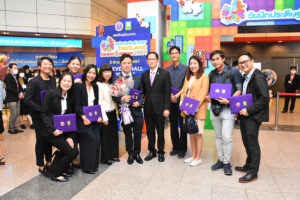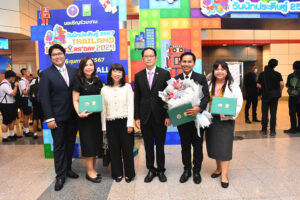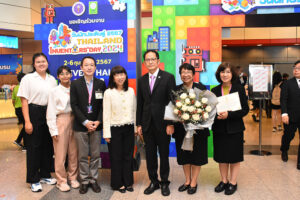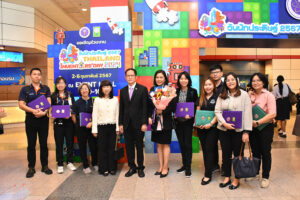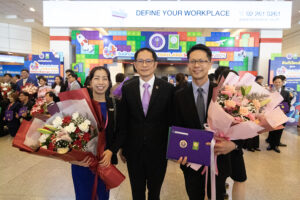
The Bangkok International Trade & Exhibition Centre was abuzz with celebration on 2 February 2024 as the National Research Council of Thailand (NRCT) announced the recipients of the prestigious 2024 NRCT Awards. Among the distinguished honorees were several accomplished researchers from the Thailand National Center for Genetic Engineering and Biotechnology (BIOTEC).
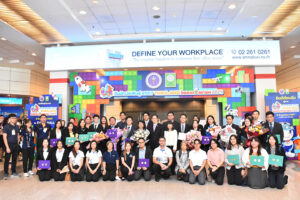
Dr. Wonnop Visessanguan, Executive Director of BIOTEC, proudly congratulated the winners on their remarkable achievements, emphasizing the institute’s commitment to fostering cutting-edge research and development.
Research Awards
Excellent Research Award in Agriculture and Biology

- Dr. Wanilada Rungrassamee, Principal Researcher and Director of Biosensing and Bioprospecting Technology Research Group and her team received a 2024 NRCT Excellent Research Award in Agriculture and Biology for their studies on “Interactions between gut microbiota and their host immune system in shrimp”. Her team contributing to this work consisted of Dr. Pacharaporn Angthong, Dr. Sage Chaiyapechara, Dr. Nitsara Karoonuthaisiri, Dr. Tanaporn Uengwetwanit, Dr. Umaporn Uawisetwathana, Ms. Sopacha Arayamethakorn, Ms. Timpika Thepsuwan, Ms. Waraporn Jangsutthivorawat, Ms. Panyisa Potibut, Mr. Mongkhol Phanthura, Mr. Metavee Phromson, Ms. Siriporn Tala and Ms. Jutatip Khudet.
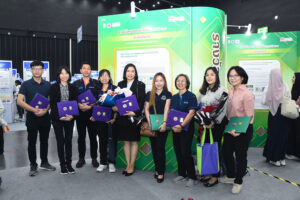
Investigations into the shrimp gut microbiome have revealed a diverse bacterial population within the digestive tract. This community exhibits dynamic fluctuations influenced by various factors, including the shrimp’s developmental stage, growth performance, pathogen exposure, and the prevailing salinity levels of its aquaculture environment. Research delving into the intricate relationship between the shrimp gut’s microbiome and its impact on biological processes, holding significant promise for revolutionizing the shrimp aquaculture industry. The key findings could pave the way for formulating of innovative feed ingredients that promote a healthy balance of gut bacteria, leading to a robust immune system and healthy shrimp. This improvement could empower shrimp to better endure challenging environments and disease resilience. Furthermore, these findings have the potential to inform the design of aquaculture systems, contributing to the sustainable growth of the shrimp aquaculture industry in the future.
Excellent Research Award in Agriculture and Biotechnology

- The research project titled “Comparative Genomics Analysis and Population Genetics Explain Speciation and Evolutionary Changes in Population Structure in Rhizophoraceae” has been honored with the 2024 NRCT’s Excellent Research Award in Agriculture and Biotechnology. Spearheaded by Dr. Sithichoke Tangphatsornruang, Director of the National Omics Center (NOC) at BIOTEC, this groundbreaking study engaged a collaborative effort with researchers from NOC, including Dr. Wirulda Pootakham, Dr. Jeremy Shearman, Dr. Panthita Ruangareerate, Ms. Duangjai Sangsrakru, Ms. Thippawan Yoocha, Mr. Nattapol Narong, Ms. Nukoon Jomchai, Mr. Chaiwat Naktang, Ms. Chutima Sonthirod, Ms. Sonicha U-thoomporn, Ms. Wasitthee Kongkachana, Ms. Supaporn Khanbo. Additionally, executives and experts from Thailand’s Department of Marine and Coastal Resources contributed to the research involving Mr. Chatri Maknuan, Director of Mangrove Forest Research and Technology Transfer Section, Mrs. Poonsri Wanthongchai, Senior Forestry Officer from Mangrove Conservation Division, Mrs. Darunee Jiumjamrassil, Director of Mangrove Research and Development Center 4, Mrs. Pranom Chumriang, Director of Mangrove Research and Development Center 5, Ms. Waratthaya Promchoo, Director of Mangrove Ecosystem Research Subdivision, Mr. Pasin Maprasop, Forestry Technical Officer from Mangrove Research and Development Institute, Mr. Tamanai Pravinvongvuthi, Director of Mangrove Research and Development Center 1, Mr. Nawin Phormsin, Forestry Technical Officer from Mangrove Research and Development Institute.
Mangrove ecosystems play a crucial role in the economy, society, and the environment. These plants have dynamically adapted to coastal changes over millions of years, particularly during periods of sea level fluctuations. Unfortunately, human activities have significantly altered coastal areas in the last century, necessitating a thorough study of mangrove plant population genetics to comprehend evolutionary changes.
The collaborative effort has successfully established a comprehensive genome database and acquired knowledge on the genetic diversity of 10 mangrove species in Thailand. These species include Bruguiera cylindrica, Bruguiera gymnorrhiza, Bruguiera hainesii, Bruguiera parviflora, Bruguiera sexangula, Ceriops decandra, Ceriops tagal, Ceriops zippeliana, Rhizophora apiculata, and Rhizophora mucronata, with accompanying distribution maps.
Integration of the genome database into evolutionary studies unveiled the genetic development of living organisms and the emergence of new species within the family Rhizophoraceae. Notably, the study identified a common ancestor shared by species in this family dating back 50 million years. Further genomic analysis demonstrated the evolutionarily selected genes responsible for salt tolerance in mangrove plants. Genome analysis of the genus Bruguiera revealed the emergence of Bruguiera hainesii over 3 million years ago through the hybridization of Bruguiera cylindrica and Bruguiera gymnorrhiza.
In addition, genetic population studies highlighted the natural diversity of each plant species, indicating sub-population structures separated by natural barriers involving the Phuket Range and Nakhon Si Thammarat Range. The research delves into the concept of Allopatric Speciation, where distinct subpopulations differentiate due to geographical barriers. Flower size is a crucial factor in pollen distribution. Species with smaller flowers attract small animals and insects as pollinators and have short range of pollination. Therefore, species with smaller flowers tend to have higher levels of population differentiation than species with large flowers. The study also sheds light on the distribution and genetic population of Ceriops, especially Ceriops decandra and Ceriops tagal, which have relatively small flowers, showcasing related evolution and distinct genetic populations aligning with the concept of Allopatric Speciation. Rhizophora mucronata, on the other hand, displays a unique genetic pattern due to ongoing mangrove restoration activities over the past two decades.
This research provides valuable scientific evidence on mangrove evolution, emphasizing the importance of understanding genetic diversity for conservation and restoration efforts. The award-winning project signifies a significant leap forward in unraveling the intricate tapestry of mangrove plant evolution.
Excellent Research Award in Engineering and Industry Research

- The research project, “High-throughput screening and identification of commercially-potent enzymes from Thai microbial bioresources: from diversity to prototype candidates,” led by Dr. Verawat Champreda, Director of the Biorefinery and Bioproduct Technology Research Group at BIOTEC, has been honored with the 2024 NRCT’s Excellent Research Award in Engineering and Industry Research.
The collaborative effort involved esteemed researchers, experts, and members of the Biorefinery and Bioproduct Technology Research Group (IBBG), including Dr. Benjarat Bunterngsook, Dr. Pattanop Kanokratana, Mr. Wuttichai Mhuantong, Ms. Katewadee Boonyapakron, Ms. Katesuda Aiewviriyasakul, Ms. Wipawee Sritusnee, Dr. Nattapol Arunrattanamook, Dr. Thanaporn Laothanachareon, Mr. Sarunyou Wongwilaiwalin, Dr. Pornkamol Unrean, Dr. Sriwan Wongwisansri, Dr. Thidarat Nimchua, Dr. Duriya Chantasingh, and Dr. Srisakul Trakarnpaiboon.
In addition to the collaborative efforts within IBBG, the project received invaluable contributions from partners, including Dr. Supawadee Ingsriswang, Dr. Sasitorn Jindamorakot, Ms. Supattra Kitikhun, Ms. Mintra Seesang, members of the Thailand Bioresource Research Center (TBRC), and Dr. Lily Eurwilaichitr from the National Energy Technology Center. Furthermore, Dr. Hataikarn Lekakan from Thammasat University played a vital role in contributing to the success of this pioneering research initiative.
Dr. Champreda and the research team have successfully developed an advanced high-throughput screening platform (HTP) for microorganisms and enzymes. This platform, driven by state-of-the-art automation, accelerates the identification of biological products with significant industrial potential.
The research team also employed metagenomics techniques to explore the hidden genetic wealth of uncultured microorganisms from natural resources in Thailand. Through the HTP, the team achieved remarkable efficiency in identifying enzymes and microorganisms capable of producing various biological products of industrial interest. The sampled microorganisms, totaling more than 1,000 species, encompass those producing enzymes e.g. plant biomass degrading and modifying enzymes and enzymes for synthesis of functional sugars, in addition to microorganisms with capabilities on degradation of hydrocarbons and bioplastics as well as production of bio-products, including biosurfactant and bioplastic.
Notably, the team successfully developed 11 prototypes of enzymes and microorganisms, offering applications in industries through crude enzyme and recombinant or whole cell biocatalyst formats, thanks to collaborative efforts with partner agencies.
This research not only underscores the untapped potential of microbial resources in Thailand but also serves as a cornerstone for enhancing the country’s industrial competitiveness. Furthermore, the findings are cataloged in TBRC’s database, establishing a valuable platform for enzymes involved in various applications as well as metagenomic database for searching of novel enzymes—a key asset for potential industrial applications.
Research Award in Agricultural Science and Biology

- Dr. Piti Amparyup, Team Leader, Marine Biotechnology Research Team, Integrative Aquaculture Biotechnology Research Group, and Dr. Walaiporn Charoensapsri, Researcher, Marine Biotechnology Research Team, Integrative Aquaculture Biotechnology Research Group, received the 2024 National Research Award in Agricultural Science and Biology of the National Research council of Thailand from a collaborative research with Assoc. Prof. Dr. Chanprapa Imjongjirak, Faculty of Science, Chulalongkorn University, for their project entitled “Development of aquafeed for sustainable commercial ornamental fish culture using the application of prebiotic-probiotic biotechnology and the advantage of Thai copepod”.
The research applied both prebiotics and probiotic lactic acid bacteria to stimulate the immune system and increase disease in Siamese fighting fish culture system, developed Thai copepod with appropriate DHA/EPA ratio and high nutritional advantages for use as health supplemented-feed of betta fish larvae, and analyzed the betta fish transcriptome to support the development of ornamental fish aquaculture. They also successfully developed the prototype of probiotic lactic acid bacteria accompanied with effective prebiotics, which are efficient in promoting health, immunity, and the resistance to infectious agents (Aeromonas hydrophila), and the knowledge guideline for application of prebiotics in combination with probiotic lactic acid bacteria to improve the immune system and increase resistance to pathogen infection in the betta fish culture system. In addition, as they accomplished in prototyping the betta fish larvae culture technology by applying the high nutritional copepod, knowledge guideline for utilization of copepod as live feed for betta fish larviculture, as well as prototypes of live copepod have been released. At present, they are ready to transfer these technologies for commercial production.
Research Award in Agriculture and Biotechnology

- Dr. Peera Jaru-ampornpan, Team Leader of the Virology and Cell Technology Research Team at BIOTEC, and Dr. Anan Jongkaewwattana, Director of the Veterinary Health Innovation and Management Research Group at BIOTEC, have been honored with the 2024 NRCT’s Research Award in Agriculture and Biotechnology for their research work titled “Nucleocapsid Protein: Multiple Roles in Enhancing Coronavirus Replication.” The collaborative effort, spearheaded by Dr. Jaru-ampornpan, included BIOTEC researcher and research assistants, Dr. Suttipun Sungsuwan, Ms. Jaraspim Narkpuk, Mr. Asawin Wanitchang, Mr. Juggragarn Jengarn, and Ms. Benjamas Chutiwitoonchai from the Virology and Cell Technology Research Team. Additionally, the project benefited from the contributions of Dr. Wuttichai Mhuantong, a researcher from the Enzyme Technology Research Team at BIOTEC.
The research work provides insights into several essential and distinct roles played by the nucleocapsid protein in influencing the growth of coronaviruses in host cells. The pig coronavirus that causes severe diarrhea—Porcine epidemic diarrhea virus (PEDV)—was used as a model for the study to create essential basic knowledge, along with establishing a platform to support the efficient production of PEDV virus particles. Ultimately, a live attenuated vaccine will be developed using knowledge about the properties of the PEDV nucleocapsid protein that affects the multiplication of the PEDV virus in cultured cells.
The study explores differences in the PEDV nucleocapsid protein between strains that can grow well in culture dishes (cell-adapted strains) and strains isolated from farms that have not yet been adapted (field-isolated strains). It also examines the characteristics of nucleocapsid proteins from strains that can grow well in culture dishes, interactions of nucleocapsid proteins from coronaviruses that infect different types of porcine intestinal cells on the growth of the PED virus in situations where there may be co-infection, and the host cell’s immune system that can resist the coronavirus. Furthermore, it delves into the new role of the coronavirus nucleocapsid protein that inhibits the host cell’s immune system.
In addition, the research highlights the potential of cell lines engineered to express additional nucleocapsid proteins as a more efficient platform for producing viral particles for use as vaccines. The knowledge and tools developed in this research can be further developed into tools for controlling and preventing the outbreak of coronavirus in pigs as well as applied to coronaviruses that can infect and cause disease in humans. This includes creating hybrid coronaviruses that grow well in cultured cells using reverse genetics as a live attenuated vaccine prototype and developing a technology platform suitable for producing high quantities of PEDV virus particles for use as a vaccine.
Research Award in Medical Science
- The the medical team from Faculty of Medicine Thammasat University (Prof. Dr. Paskorn Sritipsukho, Prof. Dr. Thana Khawcharoenporn, Assoc. Prof. Dr. Araya Satdhabudha, Asst. Dr. Boonying Siribumrungwong and Asst. Prof. Dr. Pichaya Tantiyavarong) in collaboration with Dr. Peera Jaru-ampornpan, Senior Researcher and Virology and Cell Technology Research Team Leader, received a 2024 NRCT Research Award in Medical Science for their “COVID-19 Vaccine Effectiveness in Thailand: a Real World Study (1st Year)”.
This work demonstrated a significant translation of research, technology and innovation, initiated by BIOTEC’s researchers from Virology and Cell Technology Research Team (AVCT) and Monoclonal Antibody Production and Application Research Team (IMAT). With their endeavor, an assay kit named “COVYD-19 Ab test kit (ELISA)” has been developed to detect antibody responses to the specific SARS-CoV-2 spike protein (receptor binding domain, RBD). The COVYD-19 Ab test kit was used as a tool for the COVID-19 pandemic management in Thailand, showing an impressive sensitivity of 94.6% and specificity of 95.8% when compared to established commercial test kits. Furthermore, BIOTEC’s team has also developed an assay capable of detecting neutralizing antibodies against SARS-CoV-2 using the surrogate virus neutralization test (sVNT). This innovation allows for the detection of multiple samples without the need for harmful viruses or expensive Biosafety Level 3 (BSL-3) laboratories.
These assays were used to evaluate the vaccine effectiveness of various vaccine regimens in preventing COVID-19 infection in Bangkok and Pathum Thani, funded by the Health Systems Research Institute (HSRI) of Thailand. They have also shed light on immune responses in confirmed COVID-19 cases with differing vaccination histories.
The studies revealed that a single dose of an inactivated vaccine is insufficient in preventing SARS-CoV-2 infection in humans. However, the effectiveness of vaccination increases by over 50% when individuals receive two doses of either inactivated or viral vector vaccines. This effectiveness rises to 79% with the administration of a third vaccine booster. These findings strongly advocate for booster regimens to significantly enhance the prevention of COVID-19, leading to widespread recommendation through various media channels in Thailand.
Research Award in Merit Award of Engineering and Industrial
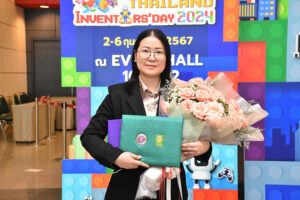
- Dr. Marisa Raita, Enzyme Technology Research Team, Biorefinery and Bioproduct Technology Research Group, National Center for Genetic Engineering and Biotechnology received 2023 National Research Award: Merit Award of Engineering and Industrial Research of the National Research Council of Thailand from research title “Development in purification process of xylooligosaccharide from sugarcane waste”. Dr. Marisa is a member of a group research which consists of Dr. Verawat Champreda, Dr. Chayanon Chotirotsukon, Miss Thanchanok Preechakul, Biorefinery and Bioproduct Technology Research Group, BOTEC, Dr. Atchara Paemanee, National Omics Center, Prof. Dr. Navadol Laosiripojana, Dr. Suchat Pongchaiphol, King Mongkut’s University of Technology Thonburi, Asst Prof. Dr. Santi Chuetor, King Mongkut’s University of Technology North Bangkok and Asst Prof. Dr. Nopparat Suriyachai, Payao University.
The research is to develop an integrated prototype purification process of xylooligosaccharide (XOS) from sugarcane waste by hydrothermal process along with detoxification and purification steps. High purity XOS over 90% observed both in the lab-scale and developed scaling up process is comparable to commercial XOS grade. This product can be used as ingredients for converting to commercially potent products such as xylose, prebiotic, bio-composites for packaging industry, hydrogel, and chemical reagents (ethanol, lactic acid, furfural, and xylitol). The developed prototype is basic technology for expanding pilot scale together with transforming agricultural residues to more value-added products and promoting the competitiveness of biorefinery industry in Thailand. This achievement provides import reduction of XOS products and decreases in dependence on foreign technology.
Invention Awards
Excellent Invention Award in Agricultural Science and Biology

- Dr. Oraprapai Gajanandana, Team Lead of Monoclonal Antibody Production and Application Research Team at BIOTEC, received the 2024 NRCT’s Excellent Invention Award in Agricultural Science and Biology. The award recognized her groundbreaking work on the invention titled “Cassava mosaic disease diagnostic kits and their application for practical disease control and management.” The collaborative effort, spearheaded by Dr. Oraprapai Gajanandana, included BIOTEC researchers Dr. Channarong Seepiban, Dr. Saengsoon Charoenvilaisiri, Mr. Sombat Rukpratanporn, Ms. Mallika Kumpoosiri, Ms. Kannawat Danwisetkanjana, Ms. Phakamat Chitchuea, Ms. Sirima Siripaitoon, and Ms. Kirana Yoohat, members of the Monoclonal Antibody Production and Application Research Team. Additionally, the project benefited from the contributions of Ms. Nuchnard Warin, Ms. Namthip Phironrit, and Ms. Bencharong Phuangrat from the Plant Virus and Bacteriophage Research Team, as well as Ms. Kularb Sutapukdee and Ms. Suttisa Duchanee from NSTDA’s RDI Management for National Strategic and Network Division.
The research team has achieved a significant milestone by successfully developing two kits based on immunological techniques for the detection of cassava mosaic disease (CMD).
- Enzyme-linked immunosorbent assay (ELISA): This detection technique underscores its practical utility by enabling the simultaneous screening of numerous samples, demonstrating high-throughput capabilities. Specifically, it allows for the examination of 96 samples concurrently within a single plate, and multiple plates can be processed in a single day. ELISA has been developed into two series.
1.1. SLCMV-ELISA Kit: This toolkit possesses the capability to specifically detect the Sri Lankan cassava mosaic virus (SLCMV), a causative agent of cassava mosaic disease responsible for agricultural and economic damages in Thailand. The SLCMV-ELISA Kit exhibits sensitivity, surpassing commercially available ELISA kits by 64 times. Notably, it achieved a relative sensitivity of 92%, a relative specificity of 100%, and a relative accuracy of 96% (n=326) compared to the standard PCR method (Dutt et al., 2005) in detecting the SLCMV virus in cassava samples obtained from planting plots.
1.2. Broad-CMV-ELISA Kit: This toolkit possesses the capabilities to detect SLCMV, African cassava mosaic virus (ACMV), which occurs in most of the cassava-producing zones of Africa, and Indian cassava mosaic virus (ICMV), which is found spread in India. The Broad-CMV-ELISA Kit demonstrates a sensitivity that is 16 times higher than the commercially available ELISA kits. In detecting the SLCMV virus in cassava samples obtained from planting plots, the developed kit demonstrated a relative sensitivity of 90%, a relative specificity of 100%, and a relative accuracy of 94% (n=301) compared to the standard PCR method (Dutt et al., 2005)..
Both the SLCMV-ELISA Kit and the Broad-CMV-ELISA Kit offer a remarkable threefold increase in cost-effectiveness compared to commercial reagents and are 20 times more economical than the standard PCR method. Specifically, the SLCMV-ELISA Kit and Broad-CMV-ELISA Kit are priced at 12 THB per test, while the commercial ELISA is available at 40 THB per test, and the PCR is priced at 250 THB per test. Nevertheless, ELISA technique necessitates access to a laboratory equipped with specialized scientific equipment and typically takes 1-2 days to generate results. To address this, the research team collaborated with the National Electronics and Computer Technology Center (NECTEC) to develop ‘WellScan’, an inexpensive device designed to efficiently read the results of the detection process.
- Rapid SLCMV-ICG strip test: the world’s first strip test for SLCMV delivers accurate results within a mere 15 minutes, specifically designed for convenient field use. Its swift turnaround time positions it as an ideal tool for disease screening and surveillance, facilitating prompt actions in response to potential infections. Crafted with field use in mind, the Rapid SLCMV-ICG strip test boasts a user-friendly design that ensures effective on-site testing even for individuals with minimal training. This emphasis on simplicity promotes immediate and informed decision-making in the face of potential infections.
Remarkably, the Rapid SLCMV-ICG strip test has demonstrated effective performance, achieving a relative sensitivity of 91%, a relative specificity of 100%, and an overall relative accuracy of 96% (n=326) in comparison to the standard PCR method (Dutt et al., 2005). Rapid SLCMV-ICG strip test is available at 100 THB per test.
Moreover, this groundbreaking research has received recognition with the filing of two patents and one petty patent, solidifying its status as a pioneering innovation. Additionally, the findings have been published in the international academic journal, Virology Journal (Virology Journal. (2021), 18(1):1-14), contributing to the scientific community’s knowledge and understanding of cassava diseases.
The alarming spread of cassava mosaic disease (CMD) has been documented in 27 provinces throughout Thailand, encompassing virtually every region of the country. As of January 2021, the affected area exceeds 281,274 rai. The consequences of this widespread outbreak extend beyond the agricultural landscape, significantly impacting cassava production, farmers, and the overall economic income of the nation.
In response to this formidable challenge, implementing a solution focused on disease screening and surveillance is imperative. This strategic approach aims to minimize the risk associated with replanting infected cassava stem cuttings and, crucially, slow down the further spread of the disease. Two instrumental tools in this endeavor are ELISA kits and the Rapid SLCMV-ICG strip test, both playing a vital role in disease surveillance and the production of virus-free cassava stems.
Versatility of the technology is noteworthy, as it extends beyond mere detection. It can diagnose diseases during the propagation stage that uses mini-stem cutting or tissue culture techniques. This application proves invaluable, ensuring that disease-free cassava stems are utilized right from the onset of the cultivation process. Furthermore, the technology assumes a pivotal role in post-planting disease surveillance. By continuously monitoring the health of cassava crops, it allows for early intervention and targeted measures to contain the spread of CMD.
Significance of this technological innovation also extends to research and development efforts. It serves as a crucial tool in the creation of plant varieties resistant to viruses, facilitates the study of virus hosts, and contributes to the development of effective pest control methods. Potential impact of this technology reaches far beyond immediate disease management, presenting opportunities for advancing agricultural resilience and sustainability.
In conclusion, multifaceted application of disease screening and surveillance technologies, such as ELISA and the Rapid SLCMV-ICG strip test, is indispensable in the battle against CMD in Thailand. By integrating these tools into comprehensive agricultural strategies, we can not only detect and manage the disease effectively but also pave the way for resilient and sustainable cassava cultivation in the future.
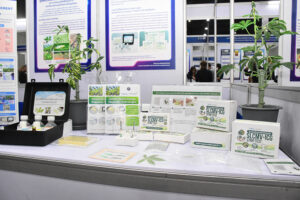
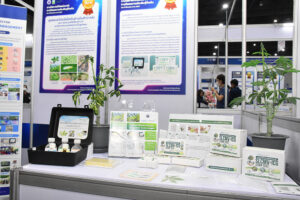
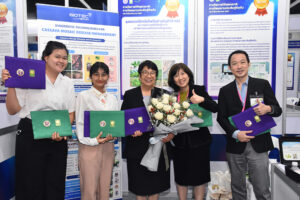
The development of cassava disease diagnosis tool kits has had profound impacts on the economy, society, security, and national development, including:
- Regional ELISA Laboratories: Six strategically placed ELISA laboratories, situated in cassava starch factories, private companies, and government agencies, serve as central hubs for Cassava Mosaic Disease (CMD) diagnosis.
- Clean Cassava Stems Production: Utilizing the tool kits ensures the production of disease-free cassava stems, delivering high-quality planting material to farmers during the seeding season.
- Field-Level Surveillance: The implementation of the Rapid SLCMV-ICG strip test allows farmers to conduct disease self-screening and surveillance in the field, facilitating early detection and intervention.
The Technology and Innovation Management for Agriculture (AGRITEC) at NSTDA has played a crucial role in distributing and promoting the Rapid SLCMV-ICG strip test. AGRITEC’s initiatives, including training workshops and tool kit distribution, aim to test efficiency in real-world cassava fields. As part of the project titled “Transferring technology for cassava production in an organic system with a market-led production mechanism,” the strip tests have been delivered to 100 farmers in Ubon Ratchathani and Yasothon provinces, contributing to the practical implementation of innovative technologies in organic cassava cultivation. These ELISA and SLCMV-ICG strip test kits are commercially available and currently in use by government sectors, companies and farmers.
Honorary Innovation Awards
Invention Award in Chemistry and Pharmacy
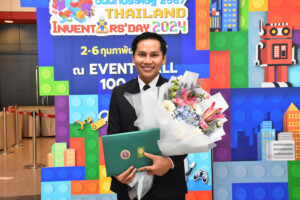
- Dr. Wansadaj Jaroenram, Researcher from Bioengineering and Sensing Technology Research Team, Biosensing and Bioprospecting Technology Research Group and his team received the 2024 NRCT’s Invention Award in Chemistry and Pharmacy for their “Sawasdee-Amp-Plus: AI-driven colorimetric nucleic acid test kit for a large-scale, point-of-care screening of future emerging diseases”. The awarded innovation was in collaboration with BIOTEC’s researchers (Ms. Wansika Kiatpathomchai, Mr. Rapheephat Suvannakad, Ms. Jantana Kampeera and Dr. Saengchan Senapin), NANOTEC’s team (Dr. Surat Teerapittayanon and Dr. Itthi Chatnuntawech) and students from Mahidol Wittayanusorn School (Mr. Kulpatch Chananam, Mr. Kunat Khongtong and Ms. Pakitta Kriangasame).
The “Sawasdee-Amp-Plus” test kit is a groundbreaking innovation that combines loop-mediated isothermal amplification (LAMP) technology and an artificial intelligence (AI) platform to detect Tilapia Lake virus (TiLV) in infected tilapia fish models. The test kit has been developed using a pH-sensitive dye to detect genetic materials of the virus, amplified in a test tube using LAMP technique (Petty Patent Application No. 2203001002).
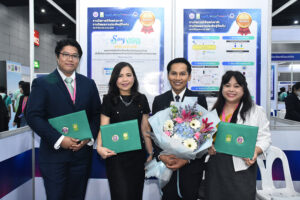
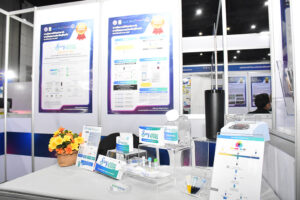
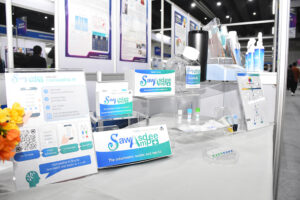
A color change in the dye, from turquoise blue to green, signals the presence of the specific virus infection. This color transformation can be easily observed either with the naked eye or through an AI mobile application. Screening for virus-infected fish involves grinding samples in an extraction solution, allowing them to sit at room temperature for a few minutes, and then diluting them with water. A 2-microliter extract is mixed into the cLAMP solution and incubated at 65 degrees Celsius for 45-60 minutes. Infected samples exhibit a green solution, while negative samples remain blue.
To streamline the readout process, an AI-based application called Peer-AI Detector is employed. This application captures, analyzes, and exports data, enabling the rapid analysis of thousands of sample tests (with a data processing capacity of approximately 10,000 tests per minute on iOS mobile), thus avoiding labor-intensive and time-consuming visual inspections.
The “Sawasdee-Amp-Plus” prototype boasts user-friendly features, cost-effectiveness, and efficiency in pathogen detection. This innovation for TiLV detection in tilapia fish aids in monitoring infectious disease spread and mitigating economic losses in aquaculture. As an alternative to PCR detection, which demands expertise, equipment, and infrastructure, this pioneering prototype holds potential for further development as a home-use test kit for preparedness against emerging diseases.
Invention award in Medical Technology
- A research of “Encase: innovation of electrolyte sanitizer” by researchers of the National Energy Technology Center, Dr. Somsak Supasitimongkol, Dr. Visarn Lilavivat, Dr. Chaiyuth Sae-kung, and Dr. Sumittra Charojrochkul (Executive Director of National Energy Technology Center) collaborative with Dr. Supakit Worasinchai, Researcher of National of Metal and Materials Technology Center and Dr. Sittiruk Roytrakul and Dr. Thaneeya Roytrakul, Researchers of the National Center for Genetic Engineering and Biotechnology received the National Research Awards: 2023 invention awards in Medical technology.
The research developed electrolyte sanitizer made from sodium chloride (NaCl) and change sodium chloride to electrolyte sanitizer, it processes with electric reaction of reactant, electrolyte production machine and electrolyte adaptor to produce “ENERclean” sanitizer. ENERclean sanitizer is composed of hypochlorous (HOCI), a main component with pH 4-6 and chorine content over 400 ppm and 900-1200 mV Oxidation-Reduction Potential. The hypochlorous is weak acid which is not harmful to people but can sanitize 99.9% SARS-CoV-2 in non-porous surface according to the standard of ASTM E1053-20 and inhibit dengue virus, fungus, and bacteria which could be found in hospitals. ENERclean sanitizer has been approved and verifies AOAC 955.14, 955.15, 955.17 and 964.02 sanitizer standard. The machine of Encase sanitizer uses NaCl and water to produce 15 litres of electrolyte water within an hour with an electricity usage of 150 watts. The ENERclean can be applied as disinfectant in hospitals and food industries. These days the research group has delivered their achievement “Encase” machine to 10 hospitals in 4 provinces and delivered over 1,500 litres of “ENERclean” sanitizer to the public and academic sectors.
Thesis Awards
Thesis Award in Medical Science

- Dr. Papon Muangsanit, Researcher from Virology and Cell Technology Research Team, Veterinary Health Innovation and Management Research Group, received the 2024 NRCT Thesis Award in Medical Science for his doctoral thesis entitles “Aligned Endothelial Cell and Schwann Cell Structures in 3D Hydrogels for Peripheral Nerve Tissue Engineering” under the supervision of Professor James Phillips, University College London UK.
The studies focused on the development of artificial nerves composed of blood vessel-like structures arranged within a collagen hydrogel. It has been demonstrated for the first time that the developed structures aid the regeneration of injured nerves and stimulate the production of blood vessels which help these nerve-growing cells. Improving the gel aspiration-ejection (GAE) technique to fabricate aligned Schwann cell structures within collagen hydrogels results in their shapes and viscoelastic properties closely resembling those of natural nerves in rats. The developed structures also demonstrated significantly aid nerve regeneration compared to the control group from experimental testing in animals. It is thus a promising technique for developing artificial nerves with blood vessel-like structures in order to assist in treating peripheral nerve injuries in the future. The engineered artificial nerves that have been developed could replace the use of nerves from the patients themselves and can be produced in sufficient sizes and quantities to accommodate a larger number of patients. Additionally, this reduces the risk of infection from additional surgery on patients to obtain nerves for transplantation.
